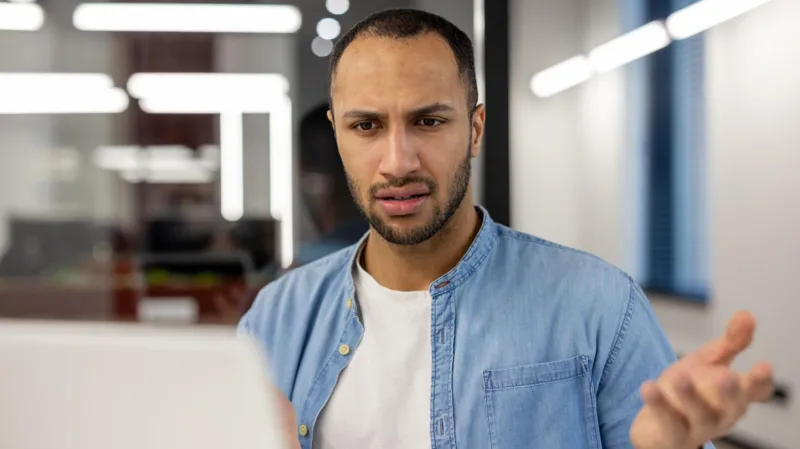Worst-ever job interviews: 'We had to crawl and moo'
The BBC has heard stories from dozens of people who went through odd, offensive, and off-putting interviews.

Lae arrived on time for her job interview at a lawyer's office in Bristol.
But after 20 minutes, it had been cancelled and she was asked to come back the next day.
She left upset, only to receive a message later saying the "cancellation" had actually been a test, which she had failed.
She did not get the job.
She says the experience was “totally bizarre” and that it spurred her to start her own business, where she makes sure to stick to a much more straightforward hiring style.
Lae is not alone. According to recruitment agency Hays, over half of people have had a negative experience during the interview process for a new job.
They got in touch following the news that John Lewis is changing its recruitment process by allowing applicants to see interview questions in advance, in an attempt to make the process fairer.
So what can bad interviews teach us? And what can interviewees and interviewers do to make the experience less questionable?
Aixin Fu says she felt peer pressure to take part in an unusual task during a group interview
Like Lae, Aixin Fu also had a bizarre experience. She applied for a student ambassador job for minimum wage at a university.
During a group interview, everyone was asked to crawl around on their hands and knees and “moo like a cow”.
“We did that for about three to four minutes,” she recalls.
"At the time, I was quite annoyed. It was highly inappropriate.
"But there was a bit of peer pressure because everyone else was doing it."
The interviewer said they were trying to see if the candidates were "fun", though Ms Fu suspects that "maybe someone just had a bit of a power trip".
‘So how many years do you think you've got left?’
Julie from Missouri in the US says she learnt that interviewers can sometimes be “really isolated” from what it’s like to be an interviewee.
This was her takeaway from a video interview she did in 2022 to be a part-time copywriter.
At first, she felt it was going well. “I was ticking all the boxes,” she says.
But towards the end, the interviewer asked: “So how many years do you think you've got left in you?”
“I’m in my early 60s,” Julie says. “I’m not going to retire for quite a while.”
Ageism is not the only prejudice people may experience during interviews.
Pearl Kasirye, a content marketing manager, says she was asked about her heritage during a second interview for a partially remote PR role at a fashion brand in Milan.
Ms Kasirye lives in London and left Uganda to live and study in Europe as a child.
She says the employer was insistent on paying her a Ugandan wage rather than a London wage for the remote work because of her background.
She chose to withdraw her application.
“Where you’re from, you have no control over,” she says, adding that she has interviewed people herself since and is “so much more mindful” about her questions.
Sometimes prejudice can be accidental — or at least less explicit — but still just as difficult for the interviewee.
Tom (not his real name) is an IT engineer who was once asked to film answers to questions for a warehouse assistant job, rather than talking to someone in a formal interview.
Tom describes himself as on the autistic spectrum, though it is not something he likes to share with people.
He says he needs clear instructions during an interview process and much prefers talking face-to-face, describing the filming process as “detached - like you’re talking to a computer".
'Do you have children?'
Many people also told the BBC they had been discriminated against during hiring based on their gender.
According to data from hiring platform Applied, nearly one in five women have been asked whether they have children, or plan to have children, during hiring processes.
One of those is Applied’s chief executive Khyati Sundaram, who says she has been asked “more times than I can count”.
It is illegal for employers to ask candidates about their marital status, whether they have children, or whether they plan to have children.
Despite this, Applied found the problem is even worse for women applying for senior roles, where two-fifths of women had been asked the same question.
Ms Sundaram says one of the reasons for this is the perceived “economic lability” of pregnancy. “The higher the pay, the more maternity you have to pay while finding a cover, and they don’t want the hassle."
Sometimes the hiring process is bad not because of prejudice but because, as Ms Sundaram puts it: “There is no benchmark for what good looks like on the interviewer side."
Her top tips for interviewers are to ask the same questions to every candidate and to design those questions with “marginalised groups” in mind.
As for Aixin Fu, she says her experience taught her to assert herself more in future interviews, especially if asked to do something “bizarre, unreasonable, or not a requirement for the job” — such as moo like a cow.
-bbc







